Ischemic Stroke
Medically reviewed by Drugs.com. Last updated on Apr 2, 2024.
What is an ischemic stroke?
An ischemic stroke occurs when blood flow to part of your brain is blocked. The block is usually caused by a blood clot that gets stuck in a narrow blood vessel. When oxygen cannot get to an area of the brain, tissue in that area may get damaged. The damage can cause loss of body functions controlled by that area of the brain. A stroke is a medical emergency that needs immediate treatment. Most medicines and treatments work best the sooner they are given.
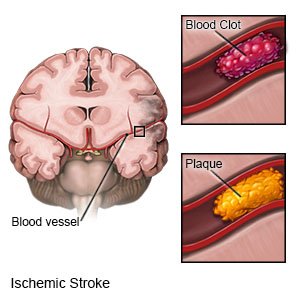 |
What are the warning signs of a stroke?
The words BE FAST can help you remember and recognize warning signs of a stroke:
- B = Balance: Sudden loss of balance
- E = Eyes: Loss of vision in one or both eyes
- F = Face: Face droops on one side
- A = Arms: Arm drops when both arms are raised
- S = Speech: Speech is slurred or sounds different
- T = Time: Time to get help immediately
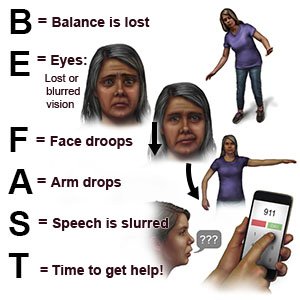 |
What are the signs and symptoms of an ischemic stroke?
Signs and symptoms may begin suddenly and worsen quickly. Any of the following may appear minutes or hours after a stroke:
- Severe headache
- Loss of vision in one or both eyes
- Numbness, tingling, weakness, or paralysis on one side of your body
- Trouble walking or speaking
- Dizziness, confusion, or fainting
What increases my risk for an ischemic stroke?
- Age 55 or older
- A family history of stroke, or a personal history of transient ischemic attack (TIA)
- Obesity or not enough physical activity
- High cholesterol, high blood pressure, or diabetes
- Smoking cigarettes or using illegal drugs
- A heart condition, such as atrial fibrillation, a recent heart attack, or valve disease
- A blood clotting disorder, such as Factor V Leiden
- In women, oral birth control pills or hormone replacement therapy
How is an ischemic stroke diagnosed?
Your healthcare provider will examine you and ask about your symptoms. He or she will ask if you have any medical conditions. You may need any of the following:
- Blood tests may be used to check your overall health. Your blood's ability to clot will also be tested. Blood tests may include a check for diabetes. Diabetes increases your risk for a stroke.
- CT or MRI pictures may show where the stroke happened and any damage to your brain. You may be given contrast liquid to help your skull and brain show up better in the pictures. Tell the healthcare provider if you have ever had an allergic reaction to contrast liquid. Do not enter the MRI room with anything metal. Metal can cause serious injury. Tell the healthcare provider if you have any metal in or on your body.
- An arteriography is used to take x-rays of your arteries to look for blood flow blockage.
How is an ischemic stroke treated?
Your healthcare provider will talk to you and your family about ways to treat an ischemic stroke. They will explain the risks and benefits of each treatment. You will be able to help create a treatment plan that may include any of the following:
- Medicines may be used to help break apart clots, or prevent clots from forming. Other medicines may be given to treat health conditions that increase the risk for a stroke. Examples are high cholesterol, high blood pressure, and diabetes.
- Surgery may be needed to remove the clot. You may also need surgery to widen arteries or to place a filter into a blood vessel. Surgery can help improve blood flow and prevent clots.
Treatment options
The following list of medications are related to or used in the treatment of this condition.
What can I do to manage an ischemic stroke?
- Go to stroke rehabilitation (rehab) if directed. Rehab is a program run by specialists who will help you recover abilities you may have lost. Specialists include physical, occupational, and speech therapists. Physical therapists help you gain strength or keep your balance. Occupational therapists teach you new ways to do daily activities, such as getting dressed. Your therapy may include movements for everyday activities. An example is being able to raise yourself from a chair. A speech therapist helps you improve your ability to talk and swallow. You may also be shown ways to manage a medical condition that increases the risk for a stroke. Examples include diabetes, high blood pressure, or a heart condition.
- Wear pressure stockings as directed. Pressure stockings help keep blood from pooling in your leg veins. Your healthcare provider can prescribe stockings that are right for you. Do not buy over-the-counter pressure stockings unless your healthcare provider says it is okay. They may not fit correctly or may have elastic that cuts off your circulation. Ask your healthcare provider when to start wearing pressure stockings and how long to wear them each day.
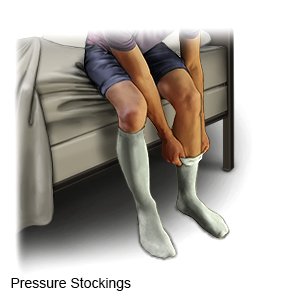
- Make your home safe. Remove anything you might trip over. Tape electrical cords down. Keep paths clear throughout your home. Make sure your home is well lit. Put nonslip materials on surfaces that might be slippery. An example is your bathtub or shower floor. A cane or walker may help you keep your balance as you walk.
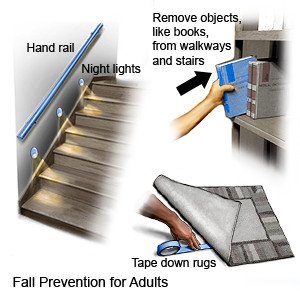
What can I do to prevent another stroke?
- Manage health conditions. A condition such as diabetes can increase your risk for a stroke. Control your blood sugar level if you have hyperglycemia or diabetes. Take your prescribed medicines and check your blood sugar level as directed.
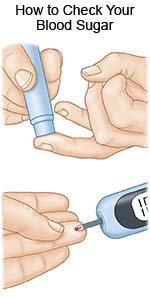
- Check your blood pressure as directed. High blood pressure can increase your risk for a stroke. If you have high blood pressure, follow your healthcare provider's directions for controlling it.
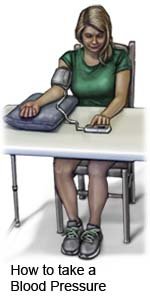
- Do not use nicotine products or illegal drugs. Nicotine and other chemicals in cigarettes and cigars can cause blood vessel damage. Nicotine and illegal drugs both increase your risk for a stroke. Ask your healthcare provider for information if you currently smoke or use drugs and need help to quit. E- cigarettes or smokeless tobacco still contain nicotine. Talk to your healthcare provider before you use these products.
- Talk to your healthcare provider about alcohol. Alcohol can raise your blood pressure. A drink of alcohol is 12 ounces of beer, 5 ounces of wine, or 1½ ounces of liquor. The recommended limit is 2 drinks within 24 hours for men and 1 drink within 24 hours for women. Do not binge drink or save a week's worth of alcohol to drink in 1 or 2 days. Limit weekly amounts as directed by your provider.
- Eat a variety of healthy foods. Healthy foods include whole-grain breads, low-fat dairy products, beans, lean meats, and fish. Eat at least 5 servings of fruits and vegetables each day. Choose foods that are low in fat, cholesterol, salt, and sugar. Eat foods that are high in potassium, such as potatoes and bananas. A dietitian can help you create healthy meal plans.

- Maintain a healthy weight. Ask your healthcare provider what a healthy weight is for you. Ask him or her to help you create a weight loss plan, if needed. Your provider can help you create small goals if you have a lot of weight to lose.
- Exercise as directed. Exercise can lower your blood pressure, cholesterol, weight, and blood sugar levels. Healthcare providers will help you create exercise goals. They can also help you make a plan to reach your goals. For example, you can break exercise into 10 minute periods, 3 times in the day. Find an exercise that you enjoy. This will make it easier for you to reach your exercise goals.
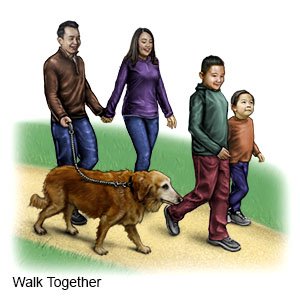
- Manage stress. Stress can raise your blood pressure. Find new ways to relax, such as deep breathing or listening to music.
What do I need to know about depression after a stroke?
Talk to your healthcare provider if you have depression that continues or is getting worse. Your provider may be able to help treat your depression. Your provider can also recommend support groups for you to join. A support group is a place to talk with others who have had a stroke. It may also help to talk to friends and family members about how you are feeling. Tell your family and friends to let your healthcare provider know if they see any signs of depression:
- Extreme sadness
- Avoiding social interaction with family or friends
- A lack of interest in things you once enjoyed
- Irritability
- Trouble sleeping
- Low energy levels
- A change in eating habits or sudden weight gain or loss
Where can I find support and more information?
- American Stroke Association
Phone: 1- 888 - 478-7653
Web Address: http://www.stroke.org
Call your local emergency number (911 in the US) or have someone else call if:
- You have any of the following signs of a stroke:
- Numbness or drooping on one side of your face
- Weakness in an arm or leg
- Confusion or difficulty speaking
- Dizziness, a severe headache, or vision loss

- You have a seizure.
- You have chest pain or shortness of breath.
- You cough up blood.
When should I seek immediate care?
- Your arm or leg feels warm, tender, and painful. It may look swollen and red.
- You have loss of balance or coordination.
- You have double vision or vision loss.
- You have unusual or heavy bleeding.
When should I call my doctor?
- Your blood pressure is higher or lower than you were told it should be.
- You have questions or concerns about your condition or care.
Care Agreement
You have the right to help plan your care. Learn about your health condition and how it may be treated. Discuss treatment options with your healthcare providers to decide what care you want to receive. You always have the right to refuse treatment. The above information is an educational aid only. It is not intended as medical advice for individual conditions or treatments. Talk to your doctor, nurse or pharmacist before following any medical regimen to see if it is safe and effective for you.© Copyright Merative 2024 Information is for End User's use only and may not be sold, redistributed or otherwise used for commercial purposes.
Learn more about Ischemic Stroke
- Atorvastatin (Lipitor): Top 12 Drug Facts You Need to Know
- Should you mix muscle relaxants with alcohol?
Treatment options
- Medications for Cerebral Thrombosis/Embolism
- Medications for Cerebrovascular Insufficiency
- Medications for Ischemic Stroke
Care guides
Symptoms and treatments
Further information
Always consult your healthcare provider to ensure the information displayed on this page applies to your personal circumstances.
